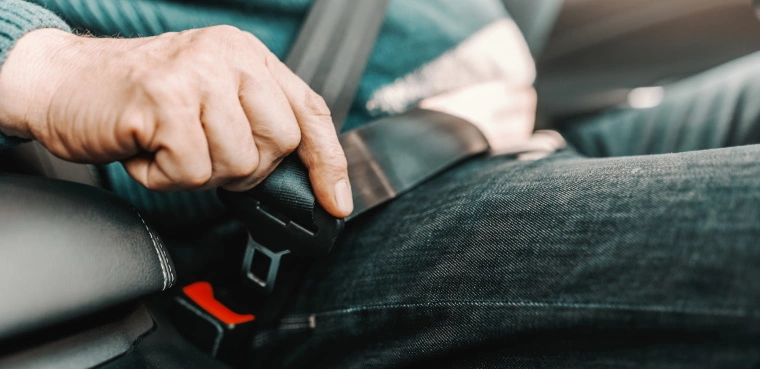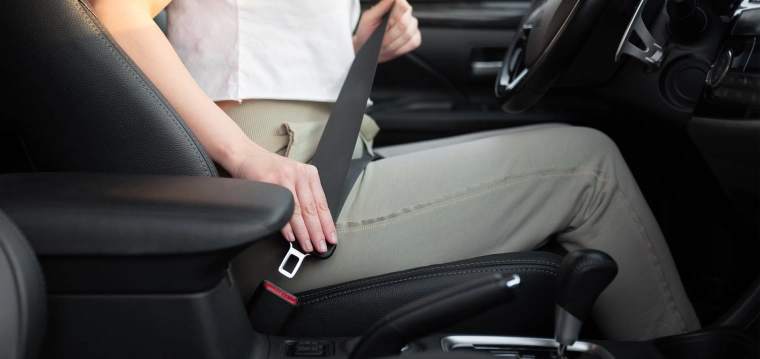When Were Seatbelts Invented?
Jack Dreyer | Thursday 9th June 2022 11:15am

Most of us wouldn’t dream of getting in a car without a seatbelt. And for good reason, too.
Seatbelts save lives, with the number of car crash fatalities greatly reduced since the three-point seatbelt was invented in 1959. But seatbelts haven’t always been such an important part of the car. In fact, it wasn’t until 1991 that all UK passengers were required to wear one.
In this blog, we’ll take a look at the history of the seatbelt.
When were seatbelts invented?
It might surprise you to learn that the original seatbelt was actually invented before the car. Pioneered by English inventor George Cayley, this early seatbelt looked very different from modern designs and was intended to keep pilots from falling out of their gliders.
It was American Edward J. Claghorn who actually patented the first seatbelt in 1885, though. His model was intended to stop tourists from falling out of New York taxis. After this, the seatbelt gained popularity slowly, as cars became faster, and more common.
For many, the seatbelt fulfilled the simple aim of keeping the driver in the car. Not what we need them for now, but once an important concern. By the 1930s, the necessity of the lap belt was becoming clear, and manufacturers were urged to put them in their cars.
In 1959, the modern three-point seatbelt was invented by Volvo engineer Nils Bohlin. His innovative cross strap design was both safer and easier to use. Able to be buckled with one hand, these seatbelts worked with the shape of the body to keep drivers and passengers safe.

When were seatbelts made mandatory to ship with vehicles?
Although a comfortable and easy to use seatbelt was invented in 1959, it took until 1968 for seatbelts to be made mandatory in UK cars. Even then, the law only covered the fitting of seatbelts in the driver’s seat. The legislation mandated all cars manufactured post-1965 had to be fitted or retrofitted with seatbelts. Although cars had to ship with seatbelts, drivers were not yet required by law to wear them.
Further seatbelt legislation was introduced in 1983. This law required that all drivers and front-seat passengers in the UK had to wear seatbelts, and in 1987, rear seatbelts became a requirement in all cars. In 1989, children in the back of cars were required to wear seatbelts. Shockingly, however, it wasn’t until 1991 that all passengers in the car were required to wear a seatbelt.
The laws may have moved slowly, but frequent campaigns in the 1970s encouraged British drivers and passengers to wear their seatbelts.

Are there any times when you can not wear a seatbelt?
Surprisingly, there are a few instances in which a seatbelt is not considered mandatory for passengers.
Buses designed for urban use with standing passengers are not required to provide seatbelts. As they typically only travel short distances at low speeds, seatbelts are not considered a necessity. In the event of a crash or a sudden application of brakes, buses aren’t travelling fast enough for seatbelts to be essential.
The only other time a passenger doesn’t need a seatbelt is if they’re investigating a fault in a trade vehicle.
That covers passengers. But when may you drive without wearing a seatbelt?There are limited seatbelt exemptions for drivers. Seatbelts aren’t mandatory when:
- Reversing
- Driving a goods vehicle with stops less than 50 metres apart
- And for licensed taxi drivers ‘plying for hire’.
Stay safe with seatbelts
As well as using seatbelts to keep you and your passengers safe, you can stay safe by conducting regular vehicle maintenance too.
Sticking to a servicing and car maintenance schedule with your local Kwik Fit is the best way to do this. If you have any questions, get in touch with us, the experts.
Any facts, figures and prices shown in our blog articles are correct at time of publication.
Featured Articles
Is it Illegal to Drive With One Headlight?
Saturday 19th July 2025
Wondering if it’s illegal to drive with one headlight? Learn about the safety risks and penalties of illegal blown bulbs and why you should fix them promptly.
Air Con in EVs & Hybrids: Experts Answer Your Questions
Monday 30th June 2025
Does air con drain EV batteries? Can you use the air con while charging an electric car? Find out the answers to these questions & more from Kwik Fit’s experts.
Why Is Your Car Making a Noise? Fixes & Tips
Friday 13th June 2025
When your car starts making unexpected noises, it can certainly be quite disconcerting; it may be nothing to worry about, but here’s what you need to know.









